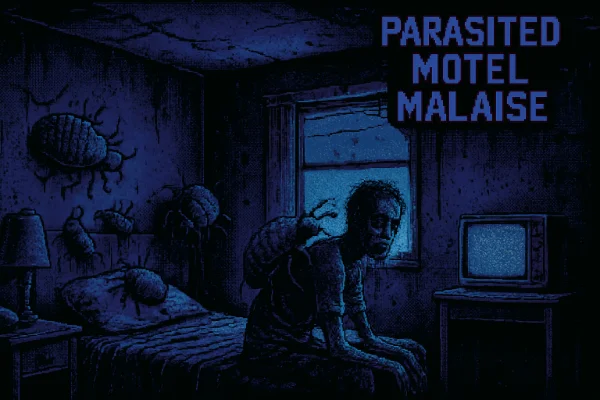Introduction:
Parasited motel malaise refers to the discomfort and health issues caused by parasites such as bed bugs, mites, and fleas commonly found in motel rooms. These tiny pests can lead to itchy bites, skin irritation, and disrupted sleep, making stays unpleasant and stressful. Recognizing the causes, symptoms, and effective prevention methods is essential for travelers to protect themselves and enjoy safe, comfortable accommodations. This guide will walk you through everything you need to know about parasited motel malaise, including how to spot it and how to avoid it altogether.
What Is Parasited Motel Malaise?
Parasited motel malaise is a term used to describe the physical and mental discomfort caused by tiny parasites that infest motel rooms. These pests—like bed bugs, mites, or fleas—feed on human blood and leave behind itchy bites, skin reactions, and a general sense of malaise, or discomfort. While not a formal medical term, this condition reflects the common experiences of travelers who encounter parasites in temporary lodging.
Common Parasites Found in Motels
Bed Bugs
Bed bugs are small, reddish-brown insects that hide in mattress seams, bed frames, and cracks. They feed at night and leave itchy, red bites in clusters or lines.
Mites
Dust mites and bird mites are microscopic pests that can cause skin irritation and allergies. While mites don’t usually bite like bed bugs, their presence can worsen discomfort.
Fleas
Fleas often hitch a ride on pets or wildlife and can jump onto motel guests. Their bites cause multiple itchy spots and can trigger allergic reactions.
What Causes Parasited Motel Malaise?
Poor Cleaning Practices
Motels that don’t clean thoroughly allow parasites to thrive unnoticed.
High Guest Turnover
Constant check-ins and check-outs help pests spread from one guest to another.
Lack of Staff Training
Without proper pest control knowledge, motel staff might miss early signs of infestation.
Easy Tips to Avoid Parasited Motel Malaise
When traveling, taking simple extra steps can greatly reduce your risk of encountering parasites in motel rooms. Here are five easy, practical tips you can start using right now:
- Use a portable bed bug detector: Small devices or traps can alert you to the presence of bed bugs before you unpack.
- Bring your own pillowcase and sheets: Using your own bedding adds a layer of protection against parasites hiding in motel linens.
- Keep your shoes off the bed and floor: Parasites can hitch rides on footwear, so avoid placing shoes near your bed or luggage.
- Seal any cracks or openings: Use tape or your luggage straps to close gaps where pests might enter your belongings.
- Store dirty laundry in sealed bags: Keeping worn clothes sealed prevents parasites from spreading to your clean items.
Signs and Symptoms to Watch For
Itchy Bites
The most common symptom is itchy red bumps or welts on your skin, often in a pattern.
Restless Sleep
Discomfort and anxiety over bites can cause trouble falling asleep or staying asleep.
Visible Clues
Look for blood stains on sheets, tiny black spots (bed bug droppings), or even live bugs.
How to Check for Parasites in Your Motel Room
Inspect Mattress and Furniture
Use a flashlight to check mattress seams, box springs, headboards, and furniture cracks for bugs or droppings.
Look for Live Bugs
Bed bugs are small but visible. Mites are tiny and hard to see, but their effects can be felt.
Monitor for New Bites
If new bites appear overnight or worsen during your stay, parasites are likely present.
Parasited Motel Malaise Parasites Comparison
| Parasite Type | Appearance | Bite Pattern | Common Hiding Places | Control Difficulty | Health Risks |
| Bed Bugs | Small, flat, reddish-brown | Clustered linear bites | Mattress seams, furniture | Moderate | Itchy bites, possible allergic reactions |
| Dust Mites | Microscopic, white | Usually no bites | Bedding, carpets, pillows | Low | Allergies, asthma triggers |
| Bird Mites | Tiny, translucent | Occasional bites | Bird nests near windows/vents | Moderate | Skin irritation, itching |
| Fleas | Small, dark, jumping insects | Multiple bites | Carpets, pet bedding, floor | Moderate to High | Itchy bites, possible infections |
| Scabies Mites | Microscopic, burrowing | Intense itching, rash | Skin folds, crowded areas | High | Severe itching, skin infection |
Prevention Before and During Your Stay
Research Motels
Check online reviews for mentions of pests or poor cleanliness before booking.
Inspect Your Room Immediately
Don’t just unpack—inspect your bed and furniture for signs of infestation.
Protect Your Luggage
Keep suitcases off the floor using racks and seal your clothes in plastic bags.
Prevention After Your Stay
Wash Clothes Hot
Immediately wash all clothes in hot water to kill any hitchhiking parasites.
Clean Your Luggage
Vacuum your luggage or consider heat treatment to eliminate any pests.
Monitor Your Skin
Watch for new bites after your trip and seek medical help if reactions worsen.
How to Treat Bites
Clean and Soothe
Wash bites with soap and water. Use anti-itch creams or calamine lotion for relief.
Avoid Scratching
Scratching can cause infections and prolong healing.
Seek Medical Advice
If bites become infected or if you have allergic reactions, see a healthcare professional.
What Motels Can Do to Prevent Parasite Problems
Regular Pest Control
Deep cleaning and professional pest treatments help control infestations.
Staff Training
Educating staff on spotting and handling infestations improves response times.
Use Protective Bedding
Mattress encasements and sealed bedding prevent bugs from hiding.
Inform Guests
Providing prevention tips can help guests avoid bringing pests in or spreading them.
Real Traveler Story
Jane, a business traveler, once stayed in a motel where she woke up with itchy bites. Inspecting the mattress seam, she found bed bugs. She immediately moved hotels and treated her belongings thoroughly. Now, Jane always inspects motel rooms first and shares her tips to help others avoid parasited motel malaise.
What You Need to Know
Parasited motel malaise is caused by parasites in motel rooms. Common signs include itchy bites and restless sleep. Causes include poor motel hygiene and frequent guest turnover. Prevention involves researching motels, inspecting rooms, and protecting your belongings.
Conclusion:
Parasited motel malaise can spoil your travel experience, but it’s preventable. Inspect your room carefully, protect your luggage, and act quickly if you notice bites or bugs. With vigilance, you can enjoy safe, comfortable stays wherever you go.
FAQs About Parasited Motel Malaise
Can I catch parasites from motel furniture?
Yes, parasites such as bed bugs often hide in mattresses, bed frames, and furniture. They bite guests during rest or sleep, causing itchy bites and discomfort.
Are motel parasites dangerous to health?
While motel parasites usually don’t spread serious diseases, their bites can cause allergic reactions, itching, and skin infections if scratched excessively.
How can I tell if my motel room has bed bugs?
Look for small blood stains on sheets, tiny black spots (bed bug droppings), live bugs, or clusters of itchy bites appearing overnight.
How long can bed bugs survive without feeding?
Bed bugs can survive several months without feeding, making them persistent and hard to eliminate if an infestation occurs.
What should I do if I get bitten?
Clean the bites with soap and water, apply anti-itch creams, avoid scratching, and consult a doctor if you experience swellinaxg or infection.
Can I prevent parasited motel malaise during my stay?
Yes, by inspecting the room thoroughly, keeping your luggage off the floor, sealing your clothes, and researching motel cleanliness before booking.





